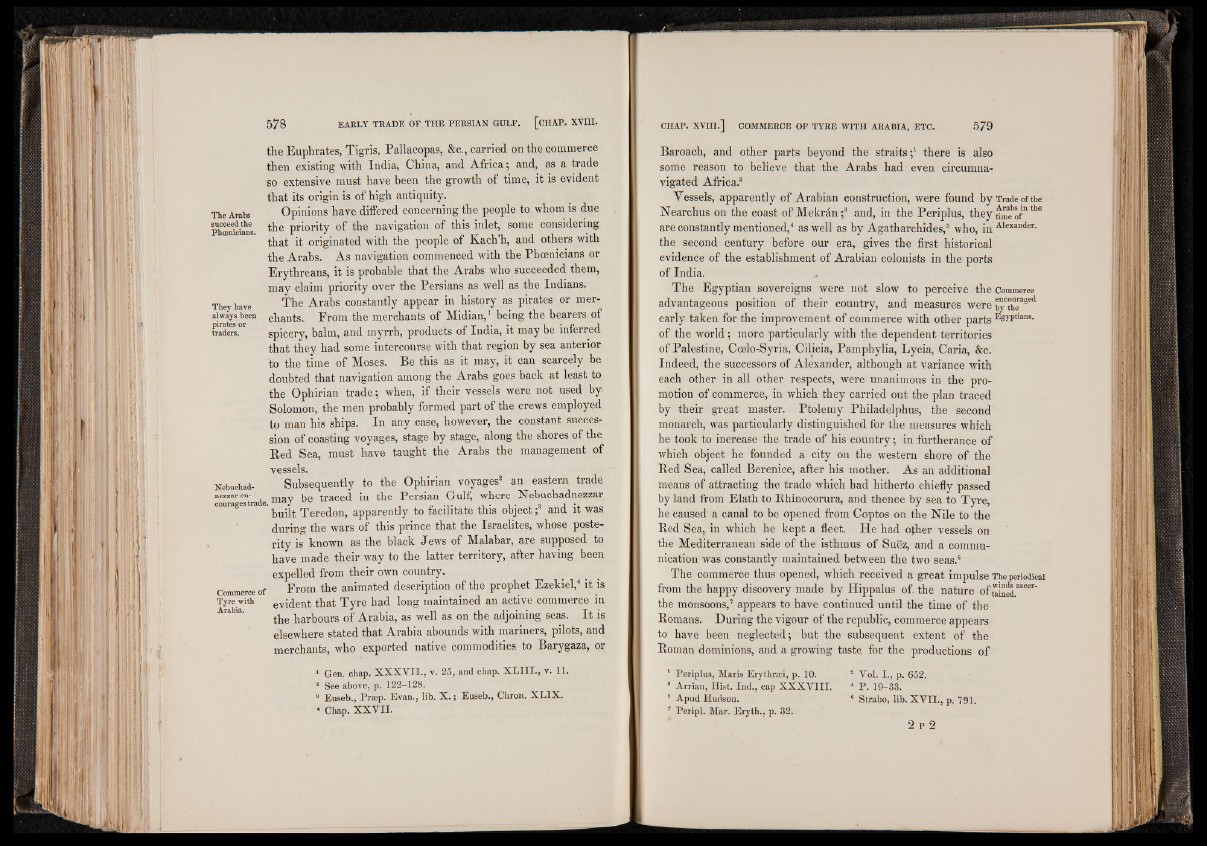
the Euphrates, Tigris, Pallacopas, &c., carried on the commerce
then existing with India, China, and Africa; and, as a trade
so extensive must have been the growth of time, it is evident
that its origin is of high antiquity.
The Arabs Opinions have differed concerning the people to. whom is due
succeed the Phoenicians. pr riority of the navigation of this inlet, some considering J . . . , „ r r , „ ^ ,, ■
that it originated with the people of Kach h, and others with
the Arabs. As navigation commenced with the Phoenicians or
Erythreans, it is probable that the Arabs who succeeded them,
may claim priority over the Persians as well as the Indians.
They have The Arabs constantly appear in history as pirates or meraiways
been ehants. From the merchants of Midian,1 being the bearers of
traders. spicery, balm, and myrrh, products of India, it may be inferred
that they had some intercourse with that region by sea anterior
to the time of Moses. Be this as it may, it can scarcely be
doubted that navigation among the Arabs goes back at least to
the Ophirian trade; when, if their vessels were not used by-
Solomon, the men probably formed part of the crews employed
to man his ships. In any case, however, the constant succession
of coasting voyages, stage by stage, along the shores of the
Bed Sea, must have taught the Arabs the management of
vessels.
Nebuchad- Subsequently to the Ophirian voyages3 an eastern trade
nezzaren- ■ m pe traced in the Persian Gulf, where Nebuchadnezzar
couragestra e. Teredoll) apparently to facilitate this object ;8 and it was
during the wars of this prince that the Israelites, whose posterity
is known as the black Jews of Malabar, are supposed to
have made their way to the latter territory, after having been
expelled from their own country.
Commerce of From the animated description of the prophet Ezekiel,4 it is
Tyre with evident that Tyre had long maintained an active commerce in
the harbours of Arabia, as well as on the adjoining seas. It is
elsewhere stated that Arabia abounds with mariners, pilots, and
merchants, who exported native commodities to Barygaza, or
1 Gen. chap. X X X V I I ., v. 25, and chap. X L I I I ., v. 11.
8 See above, p. 122-128.
8 Euseb., Prsep. Evan., lib. X . ; Euseb., Chron. XL1X.
* Chap. X X V I I .
Baroach, and other parts beyond the straits ;1 there is also
some reason to believe that the Arabs had even circumnavigated
Africa.3
Vessels, apparently of Arabian construction, were found by Trade of the
Nearchus on the coast of Mekran;3 and, in the Periplus, they tim^o™ the
are constantly mentioned,4 as well as by Agatharchides,5 who, in Alexander-
the second century before our era, gives the first historical
evidence of the establishment of Arabian colonists in the ports
of India. a
The Egyptian sovereigns were not slow to perceive the Commerce
advantageous position of their country, and measures were Mah'u 1
early taken for the improvement of commerce with other parts Eot1**118-
of the world; more particularly with the dependent territories
of Palestine, Ccelo-Syria, Cilicia, Pamphylia, Lycia, Caria, &c.
Indeed, the successors of Alexander, although at variance with
each other in all other respects, were unanimous in the promotion
of commerce, in which they carried out the plan traced
by their great master. Ptolemy Philadelphus, the second
monarch, was particularly distinguished for the measures which
he took to increase the trade of his country; in furtherance of
which object he founded a city on the western shore of the
Bed Sea, called Berenice, after his mother. As an additional
means of attracting the trade which had hitherto chiefly passed
by land from Elath to Bhinocorura, and thence by sea to Tyre,
he caused a canal to be opened from Coptos on the Nile to the
Bed Sea^ in which he kept a fleet. He had other vessels on
the Mediterranean side of the isthmus of Suez, and a communication
was constantly maintained between the two seas.6
The commerce thus opened, which received a great impulse The periodical
from the happy discovery made by Hippalus of. the nature of ascer~
the monsoons,1 appears to have continued until the time of the
Bomans. During the vigour of the republic, commerce appears
to have been neglected; but the subsequent extent of the
Boman dominions, and a growing taste for the productions of
1 Periplus, Maris Erythrsei, p. 10. 8 Vol. I ., p. 652.
8 Arrian, Hist. Ind., cap X X X V I I I . 4 P . 19-33.
5 Apud Hudson. 8 Strabo, lib. X V II., p. 791.
7 Peripl. Mar. Eryth., p. 32.